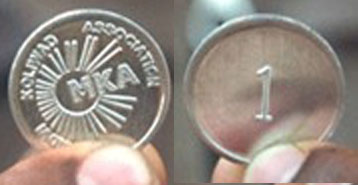In India however, customers insist on correct change and unable to get sufficient coins from the banks, traders have to pay a heavy premium to get the coins. "For one rupee coins worth Rs100 one has to pay Rs114, while for two rupee coins worth Rs100 one has to pay Rs115. For five rupee coins worth Rs100 one has to pay Rs118. These rates keep changing. During festivals, the premium goes as high as Rs125 for coins worth Rs100", said a trader.
Fed Up with the coin shortage, the traders in the south Mumbai wholesale markets of Masjid Bunder and Bhendi Bazaar have hit upon an idea to use their own tokens which are honoured within their community, virtually like official currency. Such tokens of Rs.1 and Rs.2 denominations have been minted by the Mandvi-Koliwad Association were put into 'circulation' in early 2012 January are proving to be an instant hit in the trading community reeling under official coin shortages and black-marketing of the small change.
 The denomination is printed on the obverse and on the reverse, the
MKA's logo is boldly minted. A customer need not legally accept a
token as much as (s)he may not accept a toffee, since the shop has no
change.
The denomination is printed on the obverse and on the reverse, the
MKA's logo is boldly minted. A customer need not legally accept a
token as much as (s)he may not accept a toffee, since the shop has no
change.
The trading community was left with no option "since over a year, the coin shortage is plaguing the markets. Tokens worth Rs50,000 have been made in the first batch; more will be made depending on the responseh, said Dinesh Shah, a grocery store owner and member of the association. "Right now, only regular traders are using the coins so that the circulation remains within the market", said another trader.
Perturbed by reports of illegally-minted small denomination coins being used in certain parts of the city, the Reserve Bank of India promised to get to the bottom of the case.
"I have gone through the reports. These are newspaper reports indicating its use in some areas. We have to verify it. I have asked the RBI's Mumbai office to get details of it," RBI Governor D. Subbarao told media persons.
RBI Deputy Governor V. Chaturvedi said that so far, nearly 12 billion coins have been put into circulation in the markets. "There is no shortage at any levels of any kind and we have sufficient stocks in our currency chests also," Chaturvedi assured, though he wondered where the coins were going, referring to the complaints of shortages.
Since it probably costs RBI more than face value to mint their coins,wouldn't RBI save, if the markets issue their own tokens accepted by the public as coins.
The writer is a regular traveller on public transport.
An edited version of this article Travails of loose change for Lankan bus commuters By Kavan Ratnatunga appeared in the SundayTimes of Sri Lanka on 2012 February 12th.